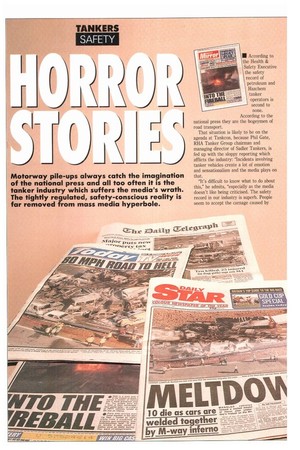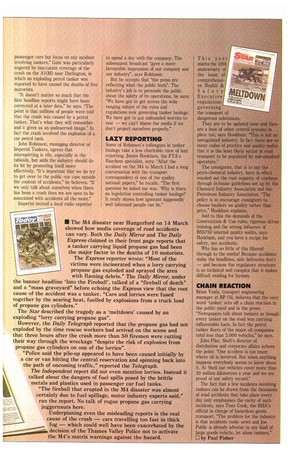Motorway pile-ups always catch the imagination of the national press
Page 44

Page 45

If you've noticed an error in this article please click here to report it so we can fix it.
and all too often it is the tanker industry which suffers the media's wrath. The tightly regulated, safety-conscious reality is far removed from mass media hyperbole.
• According to the Health & Safety Executive the safety record of petroleum and Hazchem tanker operators is second to none.
According to the national press they are the bogeymen of road transport.
That situation is likely to be on the agenda at Tankcon, because Phil Gate, RHA Tanker Group chairman and managing director of Sadler Tankers, is fed up with the sloppy reporting which afflicts the industry: "Incidents involving tanker vehicles create a lot of emotion and sensationalism and the media plays on that.
"It's difficult to know what to do about this," he admits, "especially as the media doesn't like being criticised. The safety record in our industry is superb. People seem to accept the carnage caused by passenger cars but focus on any incident involving tankers." Gate was particularly angered by inaccurate coverage of the crash on the Al(M) near Darlington, in which an exploding petrol tanker was reported to have caused the deaths of five motorists.
"It doesn't matter so much that the first headline reports might have been corrected at a later date," he says. "The point is that millions of people were told that the crash was caused by a petrol tanker. That's what they will remember and it gives us an undeserved image." In fact the crash involved the explosion of a car petrol tank.
John Robinson, managing director of Imperial Tankers, agrees that misreporting is rife, especially in the tabloids, but adds the industry should do its bit by promoting itself more effectively. "It's important that we do try to get over to the public our case outside the context of accidents," he believes. "If we only talk about ourselves when there has been a crash then we are seen to be associated with accidents all the more."
Imperial invited a local radio reporter to spend a day with the company. The subsequent broadcast "gave a more favourable impression of our company and our industry", says Robinson.
But he accepts that "the press are reflecting what the public feels". The industry's job is to persuade the public about the safety of its operations, he says: "We have got to get across the wide ranging nature of the rules and regulations now governing tanker haulage. We have got to put unfounded worries to rest — we can't blame the media if we don't project ourselves properly."
LAZY REPORTING
Some of Robinson's colleagues in tanker haulage take a less charitable view of lazy reporting. James Hookham, the FTA's Hazchem specialist, says: "After the accident on the M4 in March I had a long conversation with the transport correspondent of one of the quality national papers," he recalls. "The first question he asked me was, 'Why is there no legislation controlling tanker haulage?' It really shows how ignorant supposedly well informed people can be." This year marks the 10th anniversary of the issue of comprehensive Health & Safety Executive regulations governing the transport of dangerous substances.
They are to be updated soon and then are a host of other control systems in place too, says Hookham. "This is not an unregulated industry. In fact there are so many codes of practice and quality audits that it is the least likely sector in road transport to be populated by sub-standard operators."
The consignors, that is to say the petro-chemical industry, have in effect weeded out the vast majority of cowboys through in-house guidelines set up by the Chemical Industry Association and the Petroleum Industry Association. "The policy is to encourage consignors to choose hauliers on quality rather than price," Hookham explains.
Add to this the demands of the Construction & Use rules, rigorous driver training and the strong influence of BS5750 internal quality audits, says Hookham, and you have a recipe for safety, not accidents.
Why has so little of this filtered through to the media? Because accidents make the headlines, safe deliveries don't — and because the regulatory structure is so technical and complex that it makes difficult reading for laymen.
CHAIN REACTION
Brian Veale, transport engineering manager at BP Oil, believes that the very word 'tanker' sets off a chain reaction in the public mind and in the press: "Newspapers talk about tankers as though every tanker on the road was carrying, inflammable fuels. In fact the petrol tanker fleets of the major oil comp= total less than 2,000 vehicles," he says.
John Pike, Shell's director of distribution and corporate affairs echoes the point: "One accident is too many where oil is involved. But when anything happens everybody seems to know about it. At Shell our vehicles cover more than 30 million kilometres a year and we are proud of our safety record."
The fact that a few incidents involving tankers can be drawn from the thousand of road accidents that take place every day only emphasises the rarity of such incidents, says Tony Cook, the RHA's official in charge of hazardous goods transport. "The problem for the industry is that accidents make news and Joe Public is already adverse to any kind of large goods vehicle, let alone tankers." CI by Paul Fisher
























































































